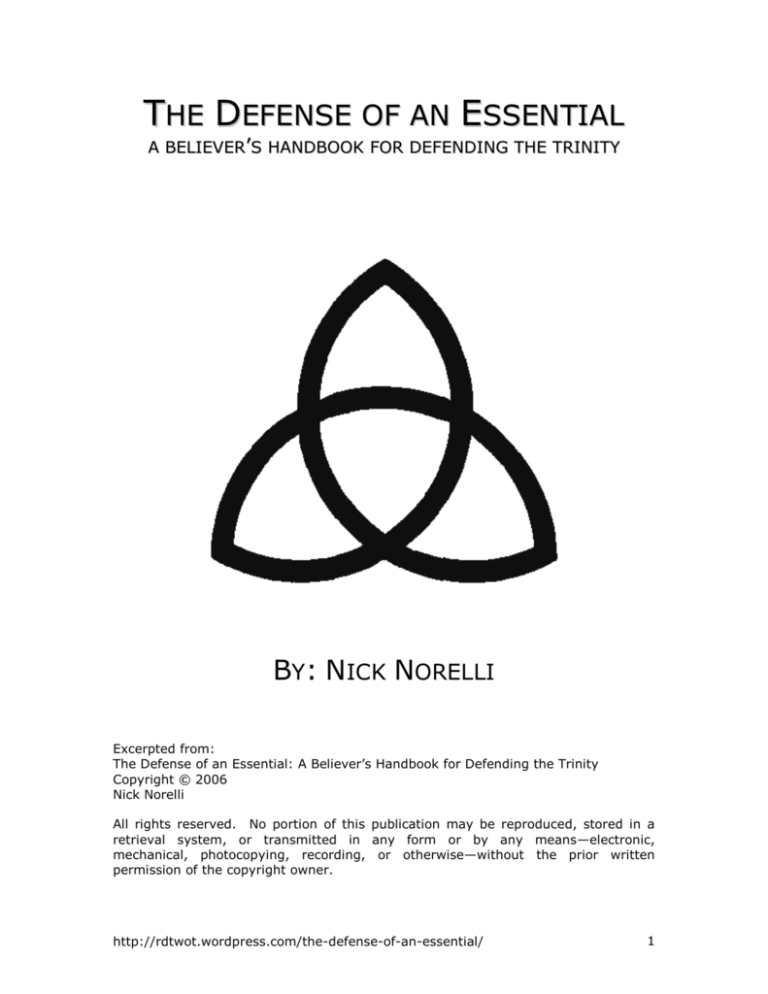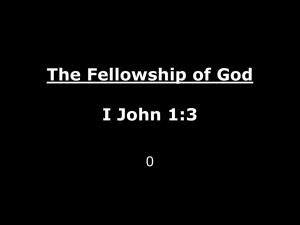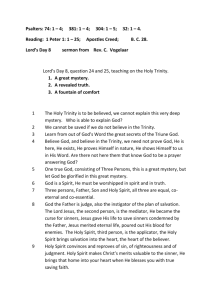
THE DEFENSE OF AN ESSENTIAL
A BELIEVER’S HANDBOOK FOR DEFENDING THE TRINITY
BY: NICK NORELLI
Excerpted from:
The Defense of an Essential: A Believer’s Handbook for Defending the Trinity
Copyright © 2006
Nick Norelli
All rights reserved. No portion of this publication may be reproduced, stored in a
retrieval system, or transmitted in any form or by any means—electronic,
mechanical, photocopying, recording, or otherwise—without the prior written
permission of the copyright owner.
http://rdtwot.wordpress.com/the-defense-of-an-essential/
1
Oneness Pentecostals on the Trinity
By: Nick Norelli
Sabellian Heresy
The error of the Oneness believer is Modalism. This is not an accurate
representation of the true oneness of God nor is it a new invention. This error fails
to see a distinction between the persons of the Godhead, by stating that God is one
person who assumes three roles, modes, manifestations, or offices. In other words,
the Father is the Son and the Holy Spirit, while the Son is the Father and the Holy
Spirit, and the Holy Spirit is the Father and the Son, and they are all resident bodily
in Jesus. Often you will see the Oneness Pentecostal say something along the lines
of them worshipping God the Father in the Son as the Spirit or some variation of
that.
They rely on a handful of pet scriptures that appear on the surface to support
their conclusion, but like every other truth, when placed in their proper setting say
nothing of the sort. This heresy surfaced in the church in the second century but
gained momentum in the early third century with a man named Sabellius. I will list
two very brief encyclopedic references to Sabellius just to get an idea of the origins
of this heresy. I urge the reader to study the various heresies condemned by
scripture and the church, so that you may have a solid foundation on exactly why
not to believe them.
“The teaching of Sabellius himself was very closely allied to the older
Modalism (Patripassianism) of Noetus and Praxeas, but was
distinguished from it by its more careful theological elaboration and by
the account it took of the Holy Spirit. His central proposition was to the
effect that Father, Son and Holy Spirit are the same person, three
names thus being attached to one and the same being. What weighed
most with Sabellius was the monotheistic interest.”1
The “Columbia Encyclopedia, Sixth Edition” states,
“fl. 215, Christian priest and theologian, b. probably Libya or Egypt. He
went to Rome, became the leader of those who accepted the doctrine
of modalistic monarchianism, and was excommunicated by Pope St.
Calixtus I in 220. Opposing the orthodox teaching of “essential
Trinity,” Sabellius advanced the doctrine of the “economic Trinity.”
God, he held, was one indivisible substance, but with three
fundamental activities, or modes, appearing successively as the Father
(the creator and lawgiver), as the Son (the redeemer), and as the Holy
Spirit (the maker of life and the divine presence within men).”2
The Legacy lives on
This is the view of the United Pentecostal Church International. Observe this
quote from their statement of faith,
“In distinction to the doctrine of the Trinity, the UPCI holds to a
oneness view of God. It views the Trinitarian concept of God, that of
http://rdtwot.wordpress.com/the-defense-of-an-essential/
2
God eternally existing as three distinctive persons, as inadequate and
a departure from the consistent and emphatic biblical revelation of
God being one. The UPCI teaches that the one God who revealed
Himself in the Old Testament as Jehovah revealed himself in His Son,
Jesus Christ. Thus Jesus Christ was and is God. In other words, Jesus
is the one true God manifested in flesh, for in Him dwells all the
fullness of the Godhead bodily (John 1:1-14; I Timothy 3:16;
Colossians 2:9). While fully God, Jesus was also fully man, possessing
a full and true humanity. He was both God and man. Moreover, the
Holy Spirit is God with us and in us. Thus God is manifested as Father
in creation and as the Father of the Son, in the Son for our
redemption, and as the Holy Spirit in our regeneration.”3
The claim is made that the Trinity doctrine is a “departure from the consistent
and emphatic biblical revelation of God being one” while they state nothing to
support their reason for this belief, yet another case of begging the question. The
assumption is that one God means one Person yet this assumption is never proven.
The Trinity doctrine is a doctrine of God being one.
This is yet another
misrepresentation on the part of those who stand in opposition, and it is done for the
express purpose of knocking down a sound doctrine.
Faulty Analogy
The following quotes are taken from the tract, 60 Questions on the Godhead
with Bible answers:
“53. Can it be proved scripturally that Jesus and the Father are one in
the same sense that husband and wife are one? No. The Godhead was
never compared to the relationship of a husband and wife. Jesus
identified Himself with the Father in a way that husband and wife
cannot be identified with each other. John 14:9-11”4
The Trinitarian argument is not that the Father and Jesus are one the same
way that a husband and wife are one. The only comparison that would possibly be
made here by a Trinitarian is that the Hebrew word for “one” (echad) is used to
describe both. This is actually two logical fallacies in one. First they have created a
faulty analogy and secondly they attribute this fallacious argument to Trinitarians
and then attempt to knock it down when in fact we don’t hold this argument to begin
with. It is equivalent to beating against the air. Trinitarians do believe that the
Father, Son, and Holy Spirit are one as nothing else in existence is one. Remember,
there is no perfectly analogous picture of the intimate relationship shared within the
Trinity.
Circular Reasoning
“56. Can Trinitarians show that three divine persons were present
when Jesus was baptized by John? Absolutely not. The one,
omnipresent God used three simultaneous manifestations. Only one
divine person was present--Jesus Christ the Lord.”5
This question and response are typical of those who oppose the Trinity. A
question is asked by a modalist and then answered by a modalist. Would one expect
to receive a proper representation of the Trinitarian view here? Of course not, but
http://rdtwot.wordpress.com/the-defense-of-an-essential/
3
they offer their answer, which is completely unfounded. Notice that all they have
done here is re-state their premise in the conclusion without actually having shown
this to be true. They’ve assumed that one God means one divine person and
therefore conclude that three divine persons can not be shown at Jesus’ baptism.
But because Trinitarians can show the Father, the Son, and the Holy Spirit to
be three persons and Trinitarians can show the Father, the Son, and the Holy Spirit
to be present at Jesus’ baptism, it then logically follows that Trinitarians can show
three divine persons present at Jesus’ baptism. It is a common argument from the
modalist that the omnipresence of God accounts for all three modes or
manifestations being at Jesus’ baptism but this claim is light on substance.
The fact is that God is omnipresent, but this is a trait shared by each member
of the Godhead (refer to The Trinity Seen Systematically.). It is illogical to claim that
Jesus in his deity (as the Father) spoke to Jesus in his humanity (as the Son) from
heaven while Jesus as the Spirit (his omnipresent deity) descended upon himself (in
his humanity). This violates the law of non-contradiction as the modalist would have
one person being three persons at the same time and in the same sense. They
might claim that these are not ‘persons’ at all but rather ‘three manifestations of one
person’ but this is shown false in that each ‘manifestation’ exhibits the qualities of
personhood. In the account of Jesus’ baptism alone we see at the very least the
Father speaking and the Son being the subject of the words spoken as irrefutable
proof of at least two personalities.
Omnipresence does not account for such
nonsense and the burden of proof is on the modalist to show such.
Semi-Scholarly
I have yet to read as extensive an attempted refutation to the Trinity and
defense of the oneness position as David K. Bernard’s book, The Oneness of God. I
see this work as probably the most representative teaching of modern oneness
theology that we have today, and consequently this spells out their logic (or lack
thereof) when arguing against orthodox Trinitarianism. According to the back cover
of this book,
“David K. Bernard is the founding pastor of New Life United
Pentecostal Church of Austin, Texas, the president of the Urshan
Graduate School of Theology, the superintendent of the South Texas
District UPC, a former college professor […] He holds a Master of
Theology in New Testament from the University of South Africa…” 6
Considering his credentials, it is fair to say that Pastor Bernard is able to
adequately represent the oneness position. For this reason I will be quoting him
extensively.
After quoting quite a few non-orthodox views of the Trinity by
“Trinitarian” authors, Pastor Bernard comments saying,
Straw Man Arguments
“It is apparent that many trinitarians interpret their doctrine to mean
three personalities, three beings, three minds, three wills, or three
bodies in the Godhead. They deny that by person they mean only
manifestations, roles, or relationships with man. Instead, they defend
an eternal threeness of essence while admitting it to be an
incomprehensible mystery. They reduce the concept of God's oneness
http://rdtwot.wordpress.com/the-defense-of-an-essential/
4
to a unity of plural persons. By their definition, they convert
monotheism into a form of polytheism, differing from pagan
polytheism only in that there is perfect agreement and unity among
the gods. Regardless of trinitarian denials, this is polytheism tritheism to be exact - and not the monotheism taught by the Bible
and upheld by Judaism.”7
The first error we notice is that Mr. Bernard has taken a decidedly Mormon
theology and represented it as the Trinitarian position. Orthodox Trinitarianism
asserts one being who is God, while the second person of the one being of God was
incarnated and possesses a body. We do not hold to the Father or the Holy Spirit
having a body, nor do we see the persons of the Trinity as separate beings.
Secondly he misrepresents the Trinitarian position as defending “an eternal
three-ness of essence” which is directly opposed to every known Trinitarian Creed
ever written. The Nicene Creed expressly states that Jesus is “of the substance of
the Father” and “being of one substance with the Father” as well as anathematizing
anyone who would say that the Son “is of a different substance or essence from the
Father.” The Athanasian Creed clearly says that “we worship one God in Trinity and
Trinity in Unity, neither confounding the Persons, nor dividing the Substance.”
Thirdly we must point out that it is not by the Trinitarian definition that
monotheism is turned into polytheism, but rather by the distorted definition that
Pastor Bernard has credited Trinitarians with. We must also debunk the myth that
plurality of persons necessitates polytheism.
As has already been set forth
numerous times throughout the course of this [site], what God is, is different from
who God is. As stated [in the section The Necessity of a Definition] a person is
simply one who is self-conscious, rational, and intelligent. Each member of the
Trinity meets the definition of a person in that they are self-conscious, they reason,
and they have intelligence.
We saw that in our systematic examination of the persons of the Godhead.
Each of them speaks and has a will, which constitutes personality. We know that the
Son has a will distinct from that of the Father from scriptures such as Luke 22:42
where Jesus says, “…nevertheless not my will, but thine, be done.” The substance
i.e. God is the “WHAT,” while the three persons are the “WHOS.” There is ONE
WHAT and THREE WHOS. There is never at any time a division in substance simply
because three distinct persons share it. A division would result in polytheism. It is
illogical to say that three gods are one god or that three persons are one person.
This violates the law of non-contradiction and Trinitarians do not teach or believe
this. Belief in either of those errors would eliminate one from being able to rightly
call their belief Trinitarian.
Double Speak
“Speaking of God as a person does not do justice to Him. The word
person connotes a human being with a human personality - an
individual with body, soul, and spirit. Thus, we limit our conception of
God if we describe Him as a person. For this reason, this book has
never said there is one person in the Godhead or God is one person.
The most we have said is that Jesus Christ is one person, because
Jesus was God manifested in flesh as a human person.” 8
http://rdtwot.wordpress.com/the-defense-of-an-essential/
5
Aside from redefining the terms (person does not connote humanity in
reference to the Trinity), Pastor Bernard has engaged in a form of nonsensical double
speak. In one breath he maintains that it’s an injustice to refer to God as a person
as well as stating that his book never describes God as one person, yet in the next
breath he affirms that Jesus who is God is one person! This cannot be veiled in the
fact that Jesus has a human nature, because to the oneness believer, the Father and
Holy Spirit is Jesus! They would have to separate the oneness they so strongly
defend if they were to logically argue that God (the Father and Holy Spirit) have no
human personality, body, soul, and spirit, for they cannot all be one and the same
person who dwell bodily in the in Jesus, while Jesus is the only one with a body!
Slippery Slope
“The use of the number three in relation to God is also dangerous. If
used to designate eternal distinctions in God, it leads to tritheism,
which is a form of polytheism. If used to designate the only
manifestations or roles God has, it limits God’s activity in a way not
done in Scripture. God has manifested Himself in numerous ways, and
we cannot even limit them to three. The use of three goes against the
clear emphasis both testaments place on associating the number one
with God… Despite the protests of trinitarians, their doctrine inevitably
leads to a practical form of tritheism.”9
It is asserted that if the number three is used in reference to making personal
distinctions within the One God, then it leads to tri-theism, which is a form of
polytheism. In other words, to be a Trinitarian believing in One God who is eternally
existent as Three Persons, will lead tri-theism which is the belief in and worship of
three gods, which of course is polytheism, and as we all know, polytheists believe in
and worship many multitudes of gods. So in effect, the author demonstrates his
inability to differentiate between being and person, and then comes to the conclusion
that believing in one being who exists as three persons will lead to the belief in three
beings, which is a form of belief in a multitude of beings. Does everyone have their
skis?
“The Jews and Moslems realize this, for this is one reason they have
rejected traditional Christendom so vigorously. Throughout history,
many Christians have also recognized this problem. As a result, some
have rejected trinitarianism in favor of Oneness belief. Others have
seen the errors of trinitarianism, but, in an attempt to preserve the
unity of God, have fallen into the greater error of denying the deity of
Jesus Christ (for example, the Unitarians and the Jehovah's
Witnesses). In short, trinitarianism emphasizes threeness in God while
the Bible emphasizes the oneness of God.”10
There is ONE God, namely Yahweh → Yahweh consists of one
substance/essence → This ONE substance/essence is shared equally by THREE
persons namely the Father, the Son, and the Holy Spirit. How is the emphasis on
three over one? And if anyone could honestly claim that the Bible does not speak of
the Father, the Son, and the Holy Spirit then they are deceiving themselves. Yes,
the Bible emphasizes the oneness of God, but so do Trinitarians! The Bible as well
emphasizes the fact that there are three persons who are God, and so do
Trinitarians!
http://rdtwot.wordpress.com/the-defense-of-an-essential/
6
1
"SABELLIUS."
LoveToKnow
1911
Online
Encyclopedia.
©2003,
http://21.1911encyclopedia.org/S/SA/SABELLIUS.htm [Italics mine]
2004
LoveToKnow.
2
“Sabellius” The Columbia Encyclopedia, 6th ed, (New York: Columbia University Press, 2001–04)
[Italics mine]
3
United
Pentecostal
Church
International.
http://upci.org/about.asp#doctrinal [Italics mine]
4
United
Pentecostal
Church
International.
http://upci.org/doctrine/60Questions.asp
"About
"60
Us:
Questions
Oneness
on
of
the
5
Ibid.
6
Bernard, David K., The Oneness of God, (Hazelwood, MO: Word Aflame, 2000) back cover
7
Ibid., pp. 259-60.
8
Ibid., p. 287
9
Ibid., p. 288
10
God"
Godhead"
Ibid.
http://rdtwot.wordpress.com/the-defense-of-an-essential/
7










